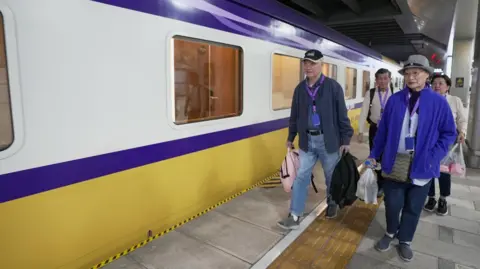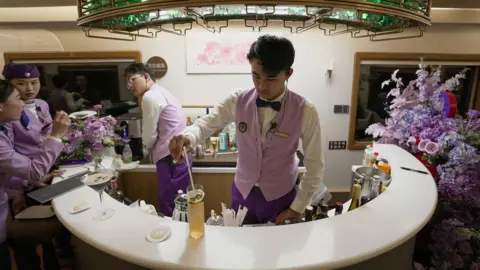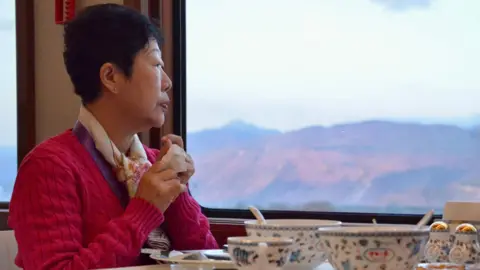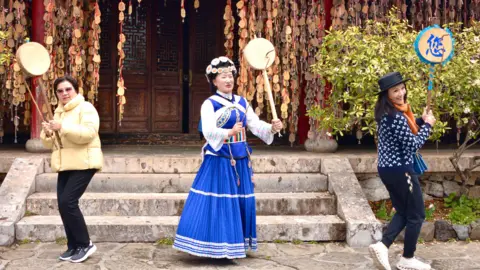China correspondent
 BBC/Benjamin Begley
BBC/Benjamin BegleyBeijing insists it will stand firm in the face of Donald Trump’s tariffs on Chinese goods. It has been trying to reassure everyone that the country is strong and the economy is resilient enough to weather this latest storm.
But this week, Chinese officials have acknowledged the potential for economic pain as a result of the unfolding trade war with the US.
One option for policymakers here is to try to increase domestic consumption to make up for lost export revenue.
China has a massive population and, if they start buying more stuff, Chinese companies won’t have to rely as much on trade overseas.
A key target in this endeavour are retirees with potentially decades of savings.
Now the government wants them to spend some of it – for the good of the country.
And initiatives like the “silver train” – which are tailored specifically to older travellers – aim to do just that.
On board the Star Express, the cocktails are poured and the karaoke microphone is passed around, as retirees party their way through China’s south-western Yunnan province.
The roast goose is being devoured with shots of baijiu, a Chinese white spirit alcohol.
“We have been working hard all these years,” says 66-year-old Daniel Ling, who is travelling with a group of retired or semi-retired friends.
“The important thing when we reach this age, is to know what is the right thing to do – and that is to really enjoy life.”
 BBC/Benjamin Begley
BBC/Benjamin BegleyThe initiative hopes to turn an economic problem into an economic solution by giving older people a fun avenue to spend more.
Families are not spending enough because they don’t feel financially safe – the property crisis has diminished the value of their number one asset: their home. And growing unemployment has also potentially made their job less secure.
Add to the mix an ageing population and low birthrates and the proportion of retirees grows each year, making it harder for the economy to support them.
But what retirees do have is time on their hands and money to spend.
So now they are to be given more opportunities to splurge with special trains designed to take them to sites they might not normally visit – parts of the country further afield, which need a financial shot in the arm.
“The main places where the silver trains will stop are undeveloped rural areas or small towns with struggling economies,” says Dr Huang Huang, a research associate from the China Tourism Academy who has been studying the potential impact of this plan.
“They will consume various products on the trains, but after they pull into a station, they will also visit tourist attractions and traditional villages.”
 BBC/Rachel Yu
BBC/Rachel YuIn Baisha, the travellers stop by the modest street stalls at the bottom of old, two-storey, wooden houses built by the local Naxi ethnic minority.
One of them approaches a vendor selling barbecued strips of yak meat. They look tasty and she buys a bagful. The vendor’s husband, who is also working at the stall, says this business is only a year old and that they need outside customers to survive.
All along this street you can get potatoes with spicy sauce, lamb skewers, fresh orange juice and the traditional clothing of the Naxi people.
This is a region where incomes are low and most young people leave when they reach a certain age because there are hardly any jobs for them.
It is also not an easy place for many retirees to reach, but these silver trains make it possible, with easy access to boarding and alighting, and with staff to help as well as extra medical support if required.
Shi Lili, 69, whose granddaughter is accompanying her, says the travelling spirit of her youth has been rekindled: “When I was young I really liked exploring other places by myself. Now I’m older, I have my family who can go with me.”
 BBC/Rachel Yu
BBC/Rachel YuBy the end of last year, 22% of China’s population were over the age of 60, making up more than 310 million people.
So, if only the smallest percentage of China’s retirees take a silver train, it can still mean millions of ticket sales. And China’s railway authorities say they plan to be operating 100 routes within the next three years.
Such trips alone are not going to fix China’s massive challenge with low consumer spending. But economists would say these moves are a step in the right direction.
Older citizens now have a much greater desire to travel compared to previous generations, creating “huge potential”, according to Dr Huang.
“Given that China’s ageing population is now a reality going into the long run – something which is unlikely to the reversed – we should find more opportunities from this rather than always turning it into a challenge.”
Back on board the train, the silver adventurers are ready to crash out. And they can do so knowing that their big day out was – at least partly – for the benefit of all.
Then it’s onto the next town.









